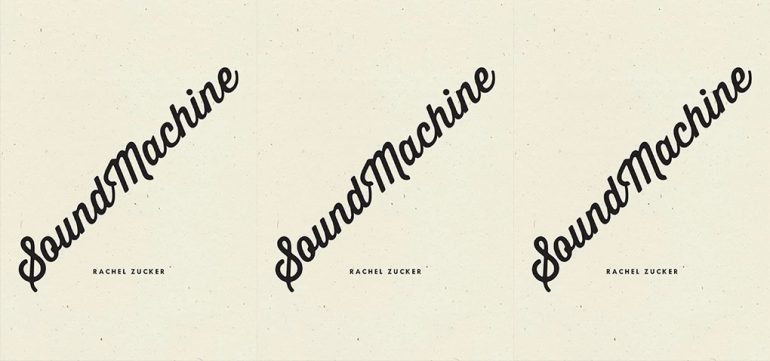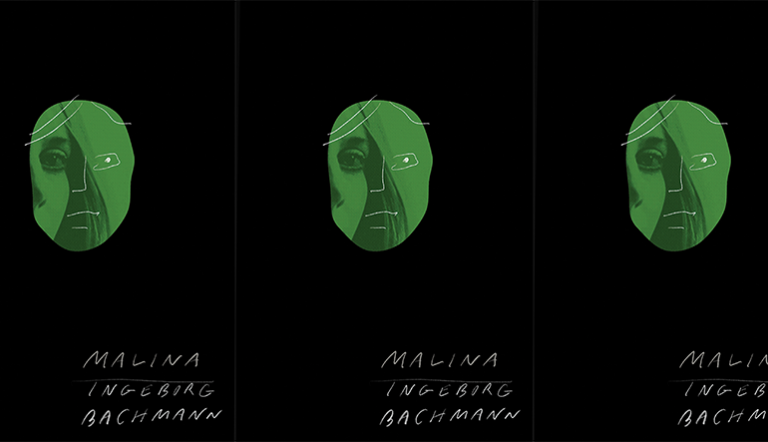SoundMachine by Rachel Zucker

SoundMachine
Rachel Zucker | September 17, 2019
Wave Books
Amazon
I am at the residency Rachel Zucker describes in her piece “Residency,” in her new book of poetic essays and essayistic poems, SoundMachine. In “Residency,” she is reading Tommy Pico’s IRL. I am rereading Pico’s Junk. She is worrying about how much dairy the food contains—so am I. She is descending into a pit of should-I-be-writing-and-how-much-and-when? I am, of course, too. It’s hard not to relate.
Even without these coincidences, SoundMachine’s immediacy and urgency make reading it an imperative. Its human voice turns the anxious, searching tone I loved in Zucker’s 2014 collection The Pedestrians back on to writing itself. Zucker is questioning and re-questioning the book she’s writing as she writes it—the very one you read her questions in. As in The Pedestrians, Zucker chooses the genre to suit the question, bouncing between prose and poetry as she asks, “Is this writing?” as she does in “Residency,” or, What counts as work? What right, asks Zucker, do I, do we writers, have to represent others? In “In the End,” a student asks her, “Why would anyone write something that would hurt other people?” What right do we have to speak at all, to filter, as we do, the world through our idiosyncratic perceptions? Is all speech reductive and, therefore, problematic? Can telling the truth about your mother literally kill her? Should we just shut up?
“All she wanted was to record everything,” says Zucker in “It Has Come to My Attention,” “her guilt, his speaking, his breathing that had once been her breath.” The desire to record is the source of tension in nearly all of these poems, as the speaker investigates the real-world repercussions of “recording” the ones you love (and, perhaps, the ones you don’t love as well) in the wake of her mother’s death. The speaker feels simultaneously that she needs to write the story of her relationship with her mother—“I have to write it” she says in “In the End”—and also that that story “killed her,” as she says in “Enough is Enough.” Throughout the collection, there is a pervasive sense that the world feels Zucker’s speech is wrong—that it wants her to speak only within a set of prefabricated, socially acceptable parameters, that it’d like other perceptions to stand in for hers, or that it can’t understand the mandate to write she works under. When she tells her friend, “I have to write it,” her son innocently asks, “Who’s making you?” When her mother reads what she’d written about her,
She had wanted to know why I kept writing about suicide. She said, I understand I wasn’t there for you and that was extremely painful. She said she had done the best she could but she knew it wasn’t good enough. She said she was sorry. She wanted to talk about the divorce. About her sex life with my father. About the years when all she could do was try not to cry in front of me. She asked if my father had bought my love, was that why I loved him? She wanted to know why I hadn’t told her all these things directly but had written about it instead. She wanted to know if I’d been abused as a child, maybe by a babysitter or by my babysitter’s teenage sons. She wanted to know, if I had not been abused, why I refused as an adult to have a relationship with my babysitter, why I made a face every time my babysitter’s name was mentioned. She said I hadn’t told the whole story. She said there were things I’d gotten wrong, so many things. She wanted to talk about her affair. Next Monday? Next Tuesday? Next week?
At once, the speaker is being told her perspective is too loud, and she is also being drowned out by the needs of her mother. Descend into my depths, the mother’s voice demands, descend into my need and thus what it means to be me, and obliterate yourself. Zucker’s fear—that she is obliterating to others in her inability to always listen, that her need to speak is obliterating for others—perhaps stems from her own obliteration by the mother-voice. “You’re not listening,” her son repeats in the title poem, whether she is listening or not. “I am. But it isn’t the right kind of listening. It isn’t a listening that feels, to the manchild, like I am listening. He does not, as the saying goes, feel heard.” She, too, is a mother. She, too, is capable of drowning others out.
That drowning noise is the soundmachine of the title, is by turns everything that distracts the speaker from herself and her own incessant thinking. “The poem is a soundmachine,” she says. “Whatever the family says they say over the sound of the soundmachine.” She insists on the question: is her family a distraction from her poetry or her poetry a distraction from her family? The speaker is unable to find a satisfying answer. She experiments with self-censorship—does this resolve the issue? Does removing names and details, as she does in the poem “Confessional,” make her speech less problematic to those who wish she’d say less? The poem begins, “This afternoon I’ve got a meeting with ____ ____ to tell her that the poem in which I call her my _____ ____ has been destroyed & I’ll never publish it or read it at a reading because I’m done writing about anyone I work with, she has my word.” It begs the question: what is lost by taking the details out? What embarrassment, pain, discomfort do these elisions save? And what texture, truth, authenticity does the poem lose? Zucker experiments with “I” and “she”—if I becomes she, can you tolerate what I have to say? And—wait—is this a “speaker” or Zucker herself?
The way Zucker bends genre is in service of that confusion, moving between lineated pieces that land safely in “poem” territory and prose blocks that might exist as essays, might exist as prose poems or might be splitting the difference between both. “This is not a poem,” she says in “Confessional,” then “if this is not a poem what is it?” then “there I go again calling everything a poem!” We’re meant to ask: -is this nonfiction? But the answer is in some of the book’s main questions: is anything? Do I own my life? Or do others, does the world?

